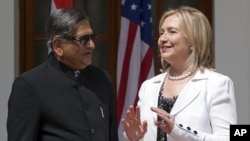U.S. Secretary of State Hillary Clinton and Indian Foreign Minister S.M. Krishna Tuesday urged Pakistan to do more to eliminate terrorist safe-havens on its territory.
The appeal came as the two countries ended another round of their strategic dialogue that also focused on Afghanistan and U.S.-India nuclear cooperation.
Clinton said the United States sees Pakistan as a “key ally” in the fight against terrorism. But at a press event capping the bilateral dialogue, the secretary of state agreed with her Indian counterpart, who said Pakistan needs to eliminate “terrorist sanctuaries” for its own interests and those of the region.
Clinton’s India visit comes less than a week after coordinated bombings killed 20 people in India’s commercial hub of Mumbai. It was the most serious attack of its kind since the November 2008 terrorist raid on Mumbai by Pakistan-based gunmen that killed more than 160 people.
The secretary welcomed recent joint efforts by India and Pakistan to resume peace talks that stalled after the 2008 attack. She also said Washington wants long-term relations with Pakistan based on mutual interests, including a recognition that terrorist safe-havens cannot be tolerated anywhere.
“During my visits to Pakistan, including my most recent one, we made it clear to the Pakistani government that confronting violent extremism of all sorts is in its interests," Clinton said. "We do not believe there are any terrorists who should be given safe haven or a free pass by any government because, left unchecked, the consequences of that kind of terrorist activity and intimidation can become very difficult to manage and control.”
The Indian government has made no secret of its apprehension that U.S. and NATO troop withdrawal plans for Afghanistan could lead to a return to power of the strongly anti-Indian Taliban at the expense of Afghan groups with close ties to India.
With Clinton at his side, Foreign Minister Krishna said Indian officials cautioned against a precipitous withdrawal from Afghanistan that could undermine India’s “special relationship” with the government of President Hamid Karzai.
“We have impressed upon the United States and other countries who have a major presence in Afghanistan that it is necessary for them to continue in Afghanistan, depending on the comfort level of the government of Afghanistan and the president of Afghanistan, Mr. Karzai," said Krishna. "And it is necessary for the United States to factor Afghanistan’s ground realities as they see it, so that they can appreciate that Afghanistan would be in a position to defend itself against the terrorism sponsored by the Taliban.”
Clinton said the United States remains fully committed to expanding cooperation with India under their landmark 2008 civil nuclear energy accord.
However, she also pressed the New Delhi government to revise a nuclear accident compensation law that U.S. officials say places too much of a burden on suppliers of nuclear plants as opposed to their would-be Indian operators, and has driven U.S. firms out the Indian market.
The dialogue was the second under a strategic partnership accord reached two years ago.
Clinton Wednesday becomes the first U.S. secretary of state to visit the southeastern commercial hub of Chennai, the former Madras, where she will deliver a policy speech focused on U.S.-Indian economic ties.




